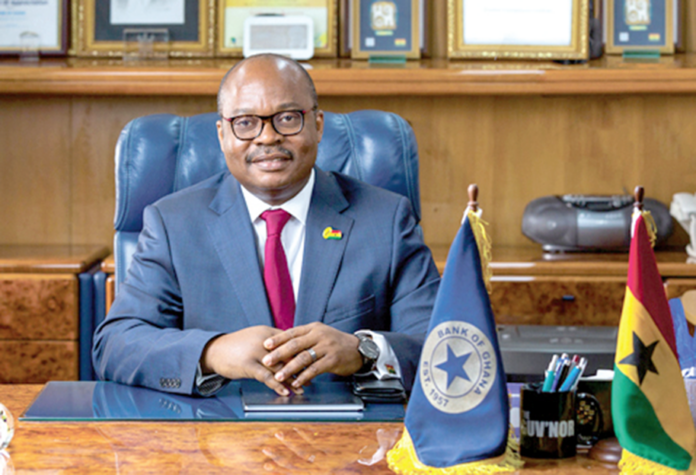The Governor of Bank of Ghana, Dr. Ernest Addison, has disclosed that since the inception of the Domestic Gold Purchasing Programme (DGPP), the Bank has added over 7.77 tonnes of monetary gold to the gold reserve, as at June 30, 2023.
The mining firms accounted for about 80% and the remaining came from the ASM sector, via approved aggregator.Hitherto, the bank reserve stood at 8.77 tonnes in the last five years.
“Indeed, we are on course to more than double the level of the Central Bank’s gold reserves by the end of this year, well ahead of the target initially set,” he said adding, “the Gold Purchase Programme uniquely provides an avenue to organically grow the country’s foreign reserves through the refining of purchased gold, without distorting incentives of local gold producers.
Speaking at the official opening of the Gold Expo programme in Takoradi, last Friday, the BOG Governor indicated that over the medium-to-long term, the programme has the potential to support the price stability mandate of the Central Bank, if the extra Ghana cedi liquidity through the gold purchases were mopped up through the open market operations.
He further indicatedthat theCentral Bank’s increased gold reserves, set within a context of a well-defined Strategic Asset Allocation (SAA) framework, would diversify reserve assets and help improve the risk-adjusted returns for the reserve portfolio.
Additionally, the Bank could leverage the gold holdings to raise funds at competitive terms for foreign exchange liquidity management.
The BOG Governor told the Gold Expo attendants that the DGPP programme has the potential of catalysing investments in the gold mining sector in Ghana. “Our local refineries are positioning themselves to take advantage of increasing investments in the sector and enhancing revenue from higher value-addition in gold exports,” he said.
The Gold for Oil Programme Initiative
According to the GoG boss, the G4O was structured such that the commodity is purchased mainly through the Precious Mineral Marketing Company (PMMC) from licensed small-scale miners and Community Mining Schemes to support the importation of petroleum products.
The introduction of the G4O, he added, was critical during the recent economic crisis, especially in the last quarter of 2022.
“The Crisis affected the foreign exchange market and led to very large adjustments in the exchange rate and distorted forward exchange rate quotes, which was used to price petrol.
Government intervention to directly engage oil producers became critical in obtaining cheaper fuel from G4O arrangements. In that direction, it became clear that leveraging the BoG Gold for reserves programme to support investment in oil would help.
“At the time, domestic ex-pump petroleum prices were changing rapidly with associated upward adjustments in transport costs, due mainly to the sharp currency depreciation and rising headline inflation”.
Governor Addison disclosed that since its inception, the G4O has yielded significant results.
Specifically, it has provided foreign exchange resources to meet petroleum products importation, led to increased competition among market players and lower ex-pump petroleum prices, and provided some stability in the FX markets.
These positive developments, he observed, have contributed to easing price pressures and thereby supporting the central bank’s efforts to bring down the high inflation levels.
Outlook and Conclusion
It is our expectation that as the benefits of the DGP programme become tangible to all the players in the value chain, activities of these illegal operators will be reduced or made to align with responsible mining practices as the economic and legal costs of operating outside the Law will be prohibitively expensive.










